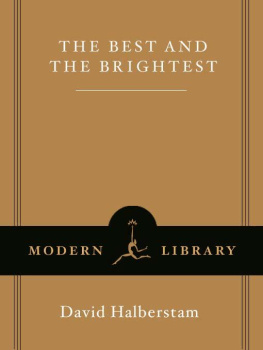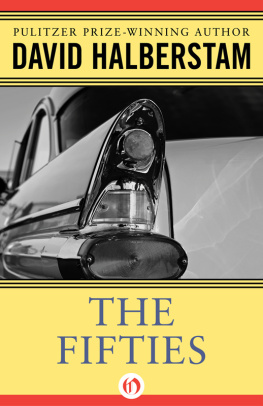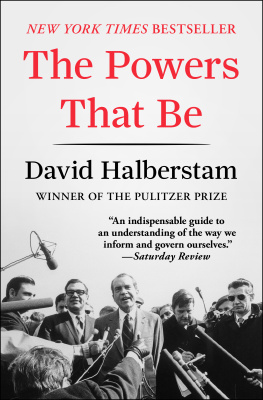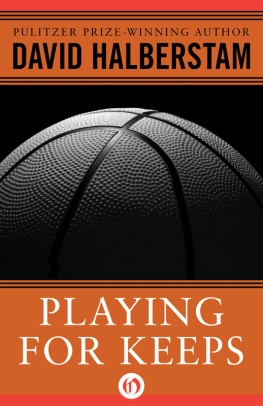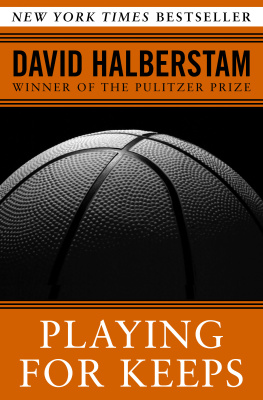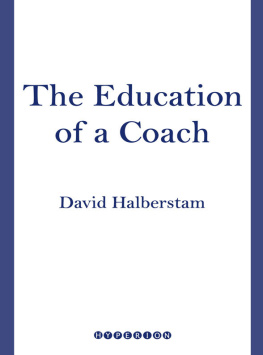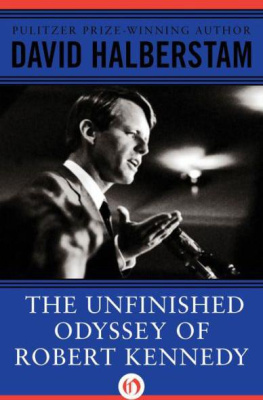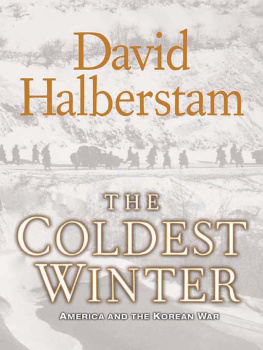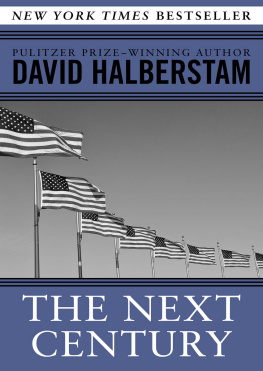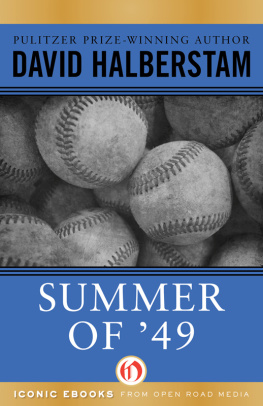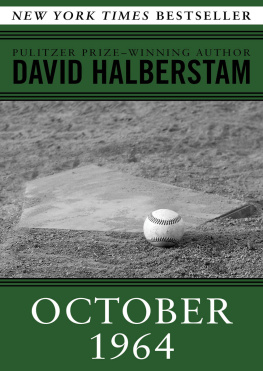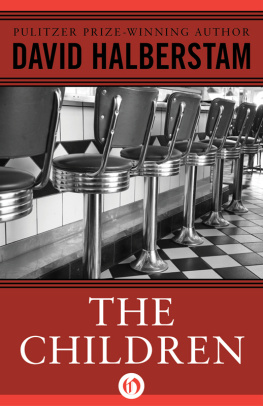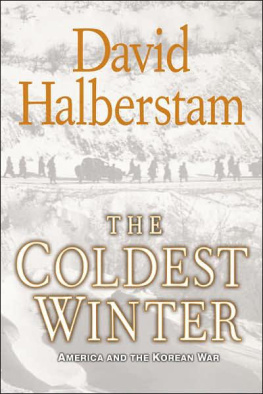David Halberstam - The Best and the Brightest
Here you can read online David Halberstam - The Best and the Brightest full text of the book (entire story) in english for free. Download pdf and epub, get meaning, cover and reviews about this ebook. year: 2001, publisher: Modern Library, genre: Politics. Description of the work, (preface) as well as reviews are available. Best literature library LitArk.com created for fans of good reading and offers a wide selection of genres:
Romance novel
Science fiction
Adventure
Detective
Science
History
Home and family
Prose
Art
Politics
Computer
Non-fiction
Religion
Business
Children
Humor
Choose a favorite category and find really read worthwhile books. Enjoy immersion in the world of imagination, feel the emotions of the characters or learn something new for yourself, make an fascinating discovery.
- Book:The Best and the Brightest
- Author:
- Publisher:Modern Library
- Genre:
- Year:2001
- Rating:5 / 5
- Favourites:Add to favourites
- Your mark:
- 100
- 1
- 2
- 3
- 4
- 5
The Best and the Brightest: summary, description and annotation
We offer to read an annotation, description, summary or preface (depends on what the author of the book "The Best and the Brightest" wrote himself). If you haven't found the necessary information about the book — write in the comments, we will try to find it.
The Best and the Brightest — read online for free the complete book (whole text) full work
Below is the text of the book, divided by pages. System saving the place of the last page read, allows you to conveniently read the book "The Best and the Brightest" online for free, without having to search again every time where you left off. Put a bookmark, and you can go to the page where you finished reading at any time.
Font size:
Interval:
Bookmark:

David Halberstam
The Best and the Brightest
Foreword by Senator John McCain

THE MODERN LIBRARY
NEW YORK
Table of Contents
For Dorothy deSantillana
Foreword
Senator John McCain
At the time of the Tet offensive, the propaganda machine of the North Vietnamese government obstructed my access to the reporting of a free press. I did not learn of Tet from Walter Cronkite or the New York Times. Hanoi Hannah brought me the news, as she always did, sandwiching it between atonal patriotic hymns intended to crush our resolverousing renditions of Springtime in the Liberated Zone and I Asked My Mother How Many Air Pirates She Shot Down Today.
Of course, the Vietnamese hyped the story to a fare-thee-well, using all the usual hyperbole that makes propaganda so colorful. For many days, American prisoners of war were informed that Khe San was within moments of falling, and then, suddenly, Hannah ceased updating us on the peoples heroic success. The Vietnamese never informed us that the Marines defending Khe San proved more heroic than the peoples liberation forces. That we learned, to our great relief, from POWs captured after Tet.
Any accurate information about the war was brought to us by newly arrived POWs. Whatever else you might think of them, North Vietnamese leaders certainly lacked an idealistic regard for the truth. Anything that did not directly benefit their war effort was dispensableincluding truth and justice. They kept us well informed on the growing antiwar movement back home, regularly broadcasting news about peace marches and statements made by notable opponents to the war. News about their military setbacks or the means Hanoi employed in prosecuting the war was rather harder to come by.
Of all the privations and injustices suffered in undemocratic nations, lack of a free press is among the worst. In prison, I missed all the staples of my comfortable life in the States. But I missed most the free, uncensored, abundant flow of information. Arriving at Clark Air Force Base on the day we were released from prison, I was as hungry for information as I was for food. As I sat down to enjoy my first decent meal in a long while, I asked a steward if he would also provide me with any newspapers and magazines he could find. I was desperate to fill in the blanks about what I knew was going on in the world, and I trusted Western journalists, particularly American journalists, to enlighten me.
Soon after I came home, the Navy allowed me to attend the National War College for a year. There I arranged sort of a private tutorial on the war, choosing all the texts myself, in the hope that I might better understand how we came to be involved in the war and why, after paying such a terrible cost, we lost. The most enlightening of all those texts, and the book that reaffirmed my high regard for American journalism and, relatedly, my faith in freedom, was David Halberstams landmark study of the men who sent us to war, The Best and the Brightest.
No one who goes to war believes once he is there that it is worth the cost to fight it by half measures. War is far too horrible a thing to drag out unnecessarily. It was a shameful thing to ask men to suffer and die, to persevere through god-awful afflictions and heartache, to endure the dehumanizing experiences that are unavoidable in combat, for a cause that the country wouldnt support over time and that our leaders so wrongly believed could be achieved at a smaller cost than our enemy was prepared to make us pay.
No other national endeavor requires as much unshakable resolve as war. If the nation and the government lack that resolve, it is criminal to expect men in the field to carry it alone. In the end, the men whose characters, motivation, and reasoning Halberstam reveals so convincingly lacked the necessary resolve to succeed because they misjudged the enemys resolve. They misjudged American power. They misjudged our South Vietnamese allies. They misjudged the Soviets and the Chinese. They misjudged the world. And, most of all, they misjudged themselves. Or so it seems to many who lost good years or their health or happiness as a consequence of their monumental misjudgments, to say nothing of those who lost their lives.
I have often seen this books title described as ironic. I dont think it is. The men who sent Americans to war in Vietnam were, by many standards, the best and the brightest. They were extraordinarily intelligent, well-educated, informed, experienced, patriotic, and capable leaders. They were elegant and persuasive. They seemed born to govern, and America once had as much confidence in them as they so abundantly had in themselves. But, in the end, they had more confidence than vision, and that failing bred in them a fateful hubris. No irony here, but a classic tragedy.
I very much doubt that Americans will ever again believe that our country has a native governing class. Thats one of the lessons of our war in Vietnam, and of the book that best explains how we got there. Thats not a bad thing. I believe Americans still love their country, believe in its ideals, but wisely prefer to judge the merits of their government on its policies. Thats a fair standard and better for the health of a democracy than romantic notions about the superiority of a natural elite.
For anyone who aspires to a position of national leadership, no matter the circumstances of his or her birth, this book should be mandatory reading. And anyone who feels a need, as a confused former prisoner of war once felt the need, for insights into how a great and good nation can lose a war and see its worthy purposes and principles destroyed by self-delusion can do no better than to read and reread David Halberstams The Best and the Brightest.
Introduction
I remember the moment when I first began to understand why I felt so driven on this particular book. I was one year into the legwork and had gone to a party for a friend's book. Teddy White, who had been an important role model for mehis Fire in the Ashes had come out when I was a sophomore in collegewas off in a corner, I had joined him, and we were talking about American politics. Suddenly another colleague wandered over, turned to Teddy, and askedI was stunned by the bluntness of the question, it was the kind of thing you might think but did not dare ask What is it that makes a bestseller, anyway?
Teddy, whose first book about the collapse of China (Thunder Out of China) had reflected much of his pessimism about Chiangs forces which had been suppressed by his employer, Harry Luce, had surprised us both with his answer: A book that burns in your bellysomething that has to be written before you can go on to anything else. He had, I realized in the weeks and months to come, defined not just one of his earlier books, but the one I was working on as well, an account of the origins of the war in Vietnam.
That book had its roots in a trip I made to Vietnam for Harpers Magazine in the fall of 1967. I had been appalled and disillusioned by what I found in my three months there. The war, despite the optimism of the Saigon command, was a stalemate: our total military superiority checked by their total political superiority. In effect this meant we could win any set-piece battle we wanted, but the other side could easily replenish their battlefield losses whenever they wanted. What was even more depressing was the optimism I found among the top Americans in Saigon, which struck me as essentially self-deception. There was much heady talk implying that we were on the very edge of a final victory and that the other side was ready to crack. Invitations were even sent out that December by some high-ranking diplomats asking friends to come to the light-at-the-end-of-the-tunnel Christmas party.
Next pageFont size:
Interval:
Bookmark:
Similar books «The Best and the Brightest»
Look at similar books to The Best and the Brightest. We have selected literature similar in name and meaning in the hope of providing readers with more options to find new, interesting, not yet read works.
Discussion, reviews of the book The Best and the Brightest and just readers' own opinions. Leave your comments, write what you think about the work, its meaning or the main characters. Specify what exactly you liked and what you didn't like, and why you think so.

